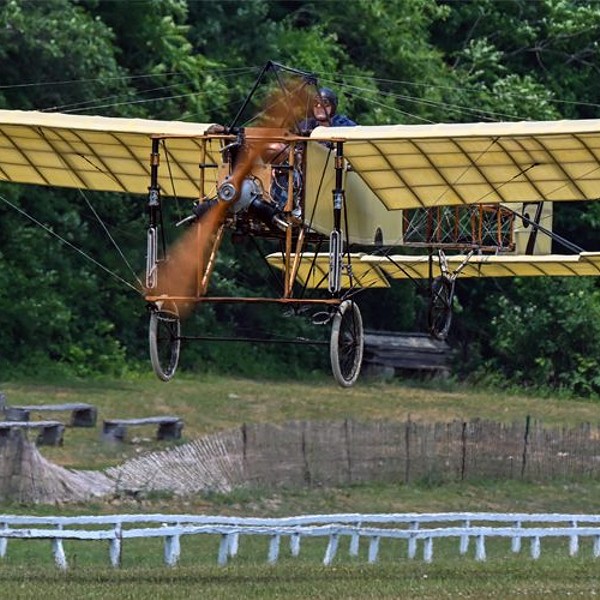To stand in the shadows of a biplane and a 19th-century Italianate mansion both, in the course of a single late-summer afternoon, does not require full imaginative immersion in a Somerset Maugham novel. Nor a time machine. A day trip to Rhinebeck—and the surrounding area—will easily accommodate your baronial (from Red to robber) flights of fancy.
Some of the most spectacular historic homes in America can be found in Northern Dutchess County—including the Locust Grove Estate in Poughkeepsie, the Vanderbilt Mansion and Franklin Delano Roosevelt’s home in Hyde Park, and the Wilderstein mansion in Rhinebeck, itself.
It would take little effort to craft of these domestic palaces and the Old Rhinebeck Aerodrome, with its collection of vintage airplanes and cars, a circuit that crackles with the optimism and glamour of the early 20th-century American “haves.” Immaculate lawns like acres-wide picnic blankets thrown down in the midst of well-maintained woods, cliff-steep views of the Hudson, paneled and lofty-ceilinged rooms inviting high society and highballs. If you can tour these sites without, even briefly, imagining yourself as a character from The Razor’s Edge, you’re a more grounded person than I.
But, of course, present-day Rhinebeck is neither a mere museum nor simply a monument to Industrial Age affluence. Rhinebeck (both the town and the village) is attractive and thriving, drawing transplants and weekenders from New York City and elsewhere, day trippers, as well as entrepreneurs and cultural presenters.
For all its activity, though, Rhinebeck’s feel is comfortable and relaxed. On a recent Sunday, the village streets were well populated with shoppers, diners, and smilingly aimless hangers out. It would be a tempting cliché to say that the village bustled; rather, it strolled. Certainly, it’s likely that some significant percentage of the crowd were out-of-towners, but the vibe was decidedly at ease and at home.
A Formerly Sleepy Town
“Well, there’s always been people here,” points out Steve Leiber, one of the founders of Upstate Films, a nonprofit film organization and theater. “And there was the aerodrome and the Dutchess County Fairgrounds. But now there are 30-plus places to eat, lots of shops, and a great variety of arts organizations. It’s pretty amazing for a one-stoplight town.”
Upstate Films was created to provide “an alternative to mainstream film exhibition” and to explore and promote “film as a medium of social communication and aesthetic experience.” It’s a daring enough mission, even now. It was all the more so when Leiber and his partners relocated from New York City in the early ‘70s. At that time, he says, Rhinebeck was a “sleepy little town.” The farming community did not trigger any prescience in Leiber and his cohorts; they weren’t certain of its eventual blossoming. It was, in fact, the town’s very quietude that provided a practical benefit, a necessity, even.
“We didn’t have anything like a traditional business plan,” Leiber says. “ We just thought, ‘Hey, let’s put on a show.’” And if the show you intend to put on is cinematic, well, plain and simple, you need a cinema. In the old Star Library building on Route 9, the aspiring group found their theater, one boarded-up and unused for years.
From the start Upstate Films’ programming was ambitious and irreverent: among the first screenings, the Marx Brothers’ one notable box-office flop, Duck Soup and Emile de Antonio’s scathing, satirical look at pre-Watergate Nixon, Millhouse. But an anecdote related on the Upstate Films’ website contextualizes the theater’s personality with a reminder of the town’s: “How rural was it in Rhinebeck? Through a phone interview snafu, Upstate’s first foreign film series became a farming film series.”
Leiber is hesitant to accept credit on behalf of Upstate Films as catalyst for Rhinebeck’s now-burgeoning cultural life. Instead he refers to the area’s indisputable natural appeal, the historic attractions, the increasing attention from real-estate-hungry city folk, and smart civic planning as elements of a “perfect storm” for the growth of the village.
He does allow, however, that Upstate Films may have functioned as an early example and anchor. “We were kind of like Army Rangers, dropped behind the lines. We’ve been really fortunate.”
Art & Commerce
Joel Weisbrod, photographer and owner of the Gazen Gallery, is a more recent arrival in Rhinebeck, though his family has ties to the region dating back to the early years of the last century. (Weisbrod’s wife’s grandfather, a Polish immigrant, came to Rhinebeck, via Pittsburgh, in 1915, to work as the town blacksmith for more than 20 years.)
















